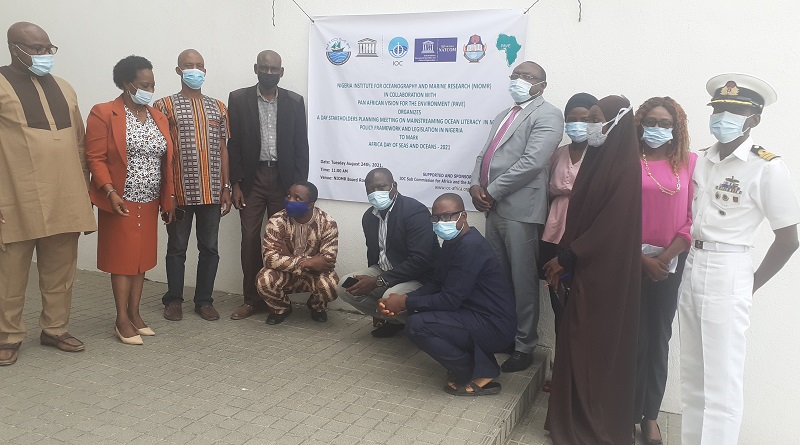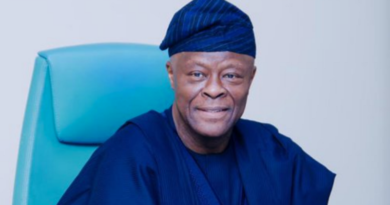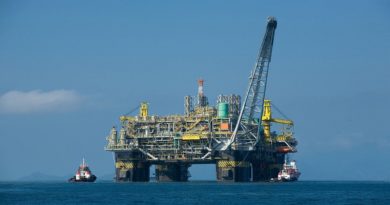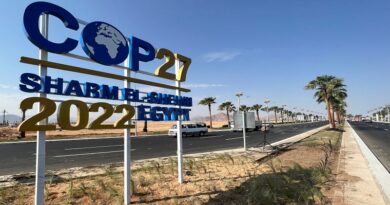Stakeholders push for ocean literacy in Maritime policy
Recognising that there is need for more sharing of knowledge and experience across stakeholders as well as to develop institutional capacity and skills to address ocean literacy concerns, the Pan African Vision for the Environment (PAVE) in collaboration with the Nigeria Institute of Oceanography and Marine Research (NIOMR), Faculty of Oceanography, University of Calabar, Nigeria and the Nigeria National Commission for UNESCO (NATCOM) with the support and sponsorship of UNESCO-IOC Sub Commission for Africa and the Adjacent Island States organized a one day national stakeholders planning workshop to share strategies, facilitate capacity building and support policy advocacy on mainstreaming Ocean Literacy in Maritime Policy Frameworks and Legislations in Nigeria to mark “Africa Day of Seas and Oceans” on the 24th August 2021 at the Board Room of the Nigerian Institute for Oceanography and Marine Research(NIOMR), Victoria Island Lagos.
The objective of the workshop was to bring together key stakeholders including policy makers, lawmakers, maritime stakeholders in the private sector, Nigerian Navy, and Civil Society Organizations, youths, women and the Media from all the coastal areas of Nigeria to facilitate, plan and lead mainstreaming Ocean Literacy in Maritime Policy Frameworks and Legislations in Nigeria, through knowledge sharing, capacity building and networking in a spirit of partnership based on values of and a respect for gender equity, diversity and participatory decision-making.
In his welcome remark, Prof. Abiodun Sule, Executive Director, Nigeria Institute for Oceanography and Marine Research (NIOMR), represented by Dr. Regina Folorunsho, Director, Marine Meteorology and Climate Department of NIOMR and the UNESCO-IOC Focal Person for Nigeria commended PAVE for the initiative, adding that, “you have given Nigeria the working document for Ocean literacy that will encompass Maritime stakeholders, policy makers, law makers, private and civil society organizations, youth and women groups and the media and definitely for the “Ocean Decade” as a whole with African Ocean and Seas being a sub-set)”.
In his keynote presentation titled “Understanding Ocean Literacy and its 7 Essential Principles: A Key Necessity for Stakeholders in Nigeria”, President, PAVE, Anthony Akpan said “Most people live their lives unaware of how their day-to-day actions impact on the health of the ocean, or how the health of the ocean impacts on their own daily lives. In Africa and Nigeria in particular stakeholders including the general public are not aware of the full extent of the economic, social, political, medical and environmental importance of the sea. Many of us are not aware that our day-to-day actions can have a cumulative effect on the health of the ocean and seas – a necessary resource that must be protected for all life on planet earth to exist”
He went further, “people lack a sense of ‘Ocean Literacy’ i.e. an understanding of the oceans influence on us and our influence on the ocean. An ocean-literate person understands the importance of the ocean to humankind, can communicate about the ocean in a meaningful way and could make informed and responsible decisions regarding the ocean and its resources”.
The PAVE boss said, “ocean literacy is more than just educating or informing the public and the marine and maritime stakeholders about the importance of oceans. Ocean literacy, through the use of behavioural change methods and adopting of a system approach, aims at facilitating the creation of an ocean literate society. Ocean literacy therefore is an understanding of the oceans influence on you and your influence on the ocean”.
Akpan went further to give the Ocean Literacy 7 Essential Principles to include the following: Earth has one big ocean with many features; the ocean and life in the ocean shape the features of Earth; the ocean is a major influence on weather and climate; the ocean makes Earth habitable; the ocean supports a great diversity of life and ecosystems; the ocean and humans are inextricably interconnected and the ocean is largely unexplored.
He called for the development of a common ‘learning forum’ by establishing a multistakeholder Ocean Literacy Action Network in Nigeria.
Commander AA Giginya of the Nigerian Navy Hydrographic Office (NNHO) brought to the fore the issue of sea blindness and the need for a National Maritime Policy and Strategy for Nigeria.
Dr. Joseph Nkwoji of the Department of Marine Sciences, University of Lagos emphasised the need to further raise awareness about marine pollution and its related issues.
Ebere Akwuebu, Programme Manager, Environmental Law Research Institute (ELRI) said there is need for policy makers/parliamentarians through legislative advocacy.
Mr. Michael Simire, Executive Director of EnviroNews Nigeria called for more media capacity building and participation to further raise awareness about ocean literacy issues in Nigeria.
Mr. Chike Paul, Deputy Director, Centre for Youth Policy, Research, Advocacy and Development (CYPRAD) emphasised the need for youth engagement on ocean literacy issues in schools and universities.
Mr. Toyin Oshaniwa, Executive Director, Natures Resource Centre and Mr. Olusola Adeoye of the Ocean Decade Committee called for determination of the existence of the various maritime policies frameworks and legislations in the various Federal Ministries saddled with Ocean issues in Nigeria. And the need for its streamlining and harmonization.
On the way forward, Akpan noted that “The focus of the United Nations Decade of Ocean Science for Sustainable Development (2021-2030) is to develop a global partnership to raise the awareness on the conservation, restoration and sustainable use of our ocean and its resources and to build an improved public knowledge base across the world’s population regarding our global ocean. An equally transformational part of the Decade is about us and our relationship with the ocean, understanding of the value of the ocean can be nurtured through ocean literacy efforts among diverse stakeholders groups. Hence the establishment of a multistakeholder Ocean Literacy Action Network in Nigeria with all participants present as members”.
He explained that a virtual International Multistakeholder Ocean Literacy Workshop will be organized as soon as possible to flesh out the vision, mission objectives, project activities and expected outcomes of the multistakeholder Ocean Literacy Action Network in Nigeria.
“These objectives match the outputs envisaged in the strategic plan 2021-2025 that will be developed for the multistakeholder Ocean Literacy Action Network in Nigeria, namely, strengthening network membership, supporting training, capacity building and Education, Policy and Legislative Advocacy, Awareness, Research, Knowledge development and dissemination and Funding Support on mainstreaming Ocean Literacy in Maritime Policy Frameworks and Legislations in Nigeria” said Akpan.




